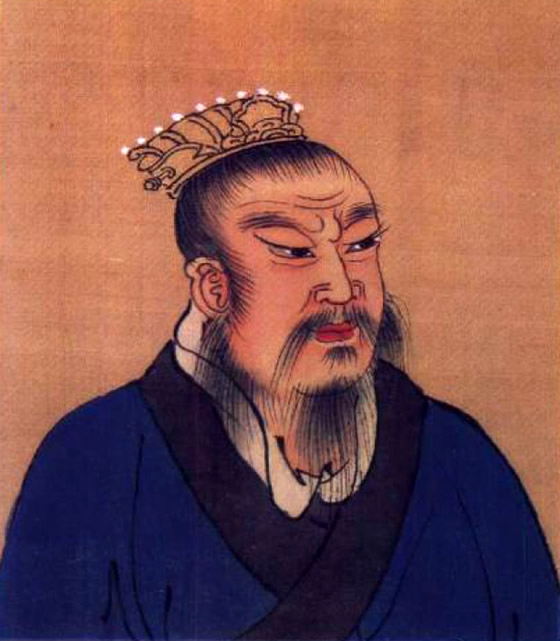Liu Bang was also known as Liu Ji (Liu Chi). He was born in 247 b.c.e. to a farming family, was the first commoner to ascend the Chinese throne, founded the long-lived Han dynasty (202 b.c.e.–220 c.e.), and died in 195 b.c.e.
As emperor he was called Gaodi (Kao-ti), which means "high emperor"; after death he was called Han Gaozu (Han Kao-tsu), which means "high progenitor of the Han". He was admired for his abilities, generosity, and taking advice from his ministers.
A minor official in 209 b.c.e., Liu rose in revolt against the oppressive Qin dynasty and joined forces with Xiang Yu (Hsiang Yu), the foremost rebel general. They agreed that the first to enter the Qin capital area would be king.
  |
In 206 b.c.e. Liu’s forces entered the Qin capital Xienyang (Hsien-yang) and received the surrender of the last Qin monarch. He was generous in victory, protected the Qin royal family, and forbade looting.
However, irreconcilable rivalry between Xiang and Liu led to war between them. Xiang’s brilliant generalship was nullified by his cruelty and arrogance; abandoned by his allies and troops, Xiang committed suicide in 202 b.c.e.
Liu then assumed the title of huangdi (huang-ti), or emperor, of the Han dynasty, becoming known by his reign title Gaodi. He chose Chang’an (Ch’ang-an) as his capital for its strategic location (it lies in the vicinity of Qin capital Xienyang). Gaozu was a pragmatic and humane ruler.
 |
| Liu Bang statue |
He lowered taxes, relaxed the severe Qin laws, proclaimed a general amnesty, and practiced frugal government so that the people could recover from decades of wars and high taxes. He maintained the Qin system of central government but was realistic: He divided the empire into two halves.
The western portion was organized into 14 provinces and counties, which were administered by central government appointees, while the eastern half was organized into 10 kingdoms ruled by his independently powerful allies over whom he only gradually gained control.
Gaozu’s greatest problem was how to deal with the nomads called Xiongnu along his northern frontier. Qin armies under the formidable general Meng Tian had defeated the Xiongnu, linking existing walls into the Great Wall of China.
In 209 b.c.e. the Xiongnu came under a ruler named Maotun who not only led raids into Han territory but also enticed some of the semi-independent kings under Gaozu to defect to him.
In 201 b.c.e. Gaozu led a mostly infantry force of 300,000 men to battle Maotun’s larger cavalry force and narrowly escaped capture. The two sides signed a peace treaty to the Xiongnu’s advantage.
In addition to establishing a border along the Great Wall, Gaozu agreed to marry his only daughter by his wife Empress Lu to Maotun and to give him regularly large quantities of silks, food, and liquor.
Empress Lu vetoed the handing over of her daughter, and another girl from the Liu clan was given the rank of princess and sent to be Maotun’s wife. Thus began 60 years of appeasing the Xiongnu because the Han government thought peace necessary to China’s economic recovery.
Gaozu died of an arrow wound in 195 b.c.e. while campaigning and was succeeded by his young son; in reality his strong-willed widow, Empress Lu, also of commoner origin, would rule for the next 15 years.
